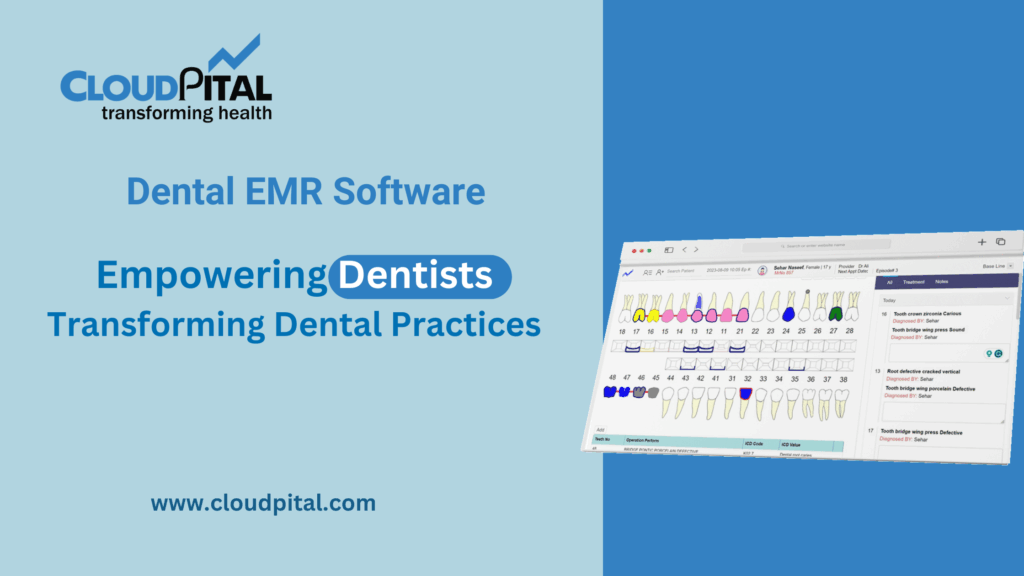Cloudpital # 1 is one of the top Hospital Software emerged as one of the significant solutions to deliver healthcare services remotely, especially in this present scenario with the COVID-19 pandemic, which indicated the need for accessible and virtual healthcare. As healthcare systems worldwide adjust to new technologies, hospital software plays an important role in supporting and enabling telemedicine services, whether it is facilitating virtual consultations or ensuring seamless integration with electronic health records (EHRs). Hospital software is at the heart of delivering efficient, secure, and patient-centered telemedicine services.
Click to Start Whatsapp Chatbot with Sales
Mobile: +966547315697
Email: sales@bilytica.com
Cloudpital # 1 Hospital Software

What Is Telemedicine?
Telemedicine is the term used for the provision of Hospital Software services by using telecommunication technologies. Telemedicine is the diagnosis and treatment of patients remotely to reduce in-person visits between healthcare providers and patients with improved access to care for individuals in rural or underserved areas.
Telemedicine encompasses:
Virtual consultations (Video calls or phone calls from healthcare providers to patients)
Monitoring remotely by using devices monitoring health metrics such as blood pressure, glucose levels etc.
Telehealth platforms (for mental health consultation, physical therapy, chronic diseases)
E-prescriptions: e-prescriptions to pharmacies
Even though telemedicine presents such an immense opportunity, the technology to manage the patients’ information, for secured communication and integration with all the activities of a hospital requires a highly robust software system.
Roles of Hospital Software in Telemedicine
Hospital software is essentially the backbone of smooth telemedicine operations. Through it, telemedicine becomes accessible, secure, and effective for both healthcare providers and patients. Here are some of the key roles played by hospital software in telemedicine:
Facilitates Virtual Consultations
The most important telemedicine component is the virtual consultancy between healthcare providers and patients. Hospital software makes this possible by integrating features such as video conferencing with secure messaging directly into the platform.
- Patients can log in and book an appointment that can be accessed remotely or from the comfort of home, without traveling to health facilities. The providers shall be able to do live face-to-face consultation over video calls to identify diagnosis and give prescription over video call.
- Hospital software ensures these live consultations are made within safe environments. The video call is encrypted such that when sensitive information regarding patients is captured during the video call; it is safe and held confidential.
- Hospital software also manages scheduling and even allows patients to book appointments online, receive reminders, reschedule, or cancel their appointments. This streamlines the whole telemedicine process and makes it better for patients.
Integration with EHRs
The other main feature of modern hospital software is the ability to integrate it with EHRs. EHRs have comprehensive information about a patient, which includes history, diagnosis, medications, allergies, and a treatment plan. This kind of integration in telemedicine is significant as it lets healthcare professionals view and update the patients’ records during online consultations in real time.
When a doctor performs a virtual consultation, he can instantly pull up a patient’s medical history from the EHR, review previous treatments, and assess the current situation. This allows them to make more informed decisions and provide personalized care during the telemedicine session.
This integration of Hospital Software enables providers to document the telemedicine session directly in the patient’s electronic record. The provider can record diagnoses, prescriptions, follow-up instructions, and any notes on the consultation. This helps maintain continuity of care in case the patient switches between in-person and virtual visits.
Secure Communication and Data Sharing
One of the most important issues in healthcare pertains to security, as sensitive patient information is being digitally transmitted across platforms through the use of telemedicine services. Hospital software is very key in providing confidentiality and ensuring integrity with regard to sensitive patient data.
Hospital software that supports telemedicine usually complies with healthcare regulations such as HIPAA (Health Insurance Portability and Accountability Act) in the U.S. HIPAA mandates strict standards for the protection of patient data, including the use of encryption, secure logins, audit trails, and data backups. Hospital software ensures that video consultations, messages, and any exchanged medical data are encrypted to protect patient privacy.

Patient Monitoring and Tracking from Distant Locations
RPM, for another matter, is another significant telemedicine aspect. RPM employs a kind of device that can let healthcare providers monitor their patients’ health conditions even without a face-to-face contact with them. These kinds of devices may track and transmit vital signs such as heart rate, blood pressure, blood sugar levels, and oxygen saturation directly to the system of the healthcare provider.
The PMS can merge with these remote monitoring devices to collect data online and analyze it. Once collected, this data can then be stored securely within a patient’s electronic health record, and the provider will gain access to it while still conducting virtual consultations or anywhere else at any given moment to monitor the patient.
For instance, a diabetic patient can use a glucose monitor that sends readings directly to the hospital software. The software then alerts the healthcare provider if the readings indicate any abnormalities. This allows doctors to intervene early and adjust treatment plans accordingly and minimizes the need for in-person visits.
Appointment Scheduling and Management
Telemedicine appointment scheduling is made easy by hospital software. A patient portal or a website of the hospital allows patients to schedule virtual consultations, which eliminates the need for a manual booking over the phone. These systems are connected with the provider’s calendar so that the doctor’s availability is updated in real-time.
Hospital software can also automatically send appointment reminders to patients through email or text message, which reduces the number of missed appointments. Patients can also reschedule or cancel appointments through the software, improving their flexibility and convenience.
On the healthcare provider’s side, hospital software can manage appointments by flagging scheduling conflicts, allowing for more efficient time management. This optimizes physician workflow and reduces delays in virtual consultations.
Billing and Payment Integration
The hospital software also facilitates the billing and payment process of telemedicine services. This helps hospitals easily create bills for virtual consultations and integrate with insurance systems to check for coverage. This is significant since insurance policies are now covering telemedicine services in more comprehensive ways.
Hospital software can automatically create bills for patients based on the services rendered during virtual consultations. This may include fees for the consultation, prescriptions, or services, and remote monitoring. The software can then integrate with payment gateways, allowing patients to pay for services securely online.
Enhancing Access to Healthcare
By integrating telemedicine with hospital software, healthcare systems can expand the access to care for a population that is underserved. Patients living in rural or remote areas can receive medical advice and consultations without having to travel long distances. This is also beneficial for those patients who have mobility problems or are short on time.
The software offers convenience in accessing telemedicine services for patients, and many hospitals use the mobile application, desktop, or kiosk. Moreover, it can offer multiple languages, therefore making communication easy and hence facilitating access to healthcare service across all walks of the community.
Advantages of Using Hospital Software in Telemedicine
Telemedicine with the incorporation of Mobile EHR presents many advantages to both service providers and consumers.
Increased Accessibility: Patients in rural or underprivileged regions can easily access healthcare services, thereby reducing the gap between access to healthcare.
Healthcare Cost Savings: Telemedicine saves healthcare costs as there is no need for visits in person, saving both patients and healthcare providers time and money.
Streamlined Workflows: The automation of scheduling, billing, and patient management by hospital software streamlines telemedicine workflows, thereby reducing administrative burdens.
Better Patient Outcomes: Remote monitoring and continuous care allow healthcare providers to intervene earlier, improving health outcomes for patients, especially those with chronic conditions.
Enhanced Patient Satisfaction: Telemedicine offers patients more convenient and flexible access to healthcare services, improving their overall experience.
Conclusion
Hospital software plays a significant role in the success of telemedicine, providing secure communications, integration with electronic health records, easy appointment scheduling, and remote patient monitoring. As telemedicine continues to evolve, the role of hospital software systems will grow even more in expanding access to care, improving operational efficiency, and enhancing patient satisfaction.
For healthcare organizations, investing in robust software that supports telemedicine can help ensure that patients receive high-quality, timely care, no matter where they are. If your healthcare organization hasn’t yet adopted telemedicine or integrated it into your hospital software, now is the time to take advantage of this powerful technology to transform the way you deliver care.
Click to Start Whatsapp Chatbot with Sales
Mobile: +966547315697
Email: sales@bilytica.com
You can explore our other blogs
Hospital Software, PMS, Mobile EHR
What role does Hospital Software play in telemedicine? similar software solutions prices were updated on 2025-07-05T17:08:55+00:00 in Saudi Arabia in Mecca, Medina, Riyadh, Khamis Mushait, Yanbu, Jeddah, Dammam, Unaizah, Uqair, Ha’il, Ta if, Al Bahah, Dhahran, King Abdullah Economic City, Najran, Diriyah, Qatif, Khafji, Jubail, Abqaiq, List of Cities and Towns in Saudi Arabia, Ras Tanura, Turubah, Jazan Economic City, Knowledge Economic City, Medina, Khobar, Abha, Tabuk, Saudi Arabia, similar software solutions prices were updated on 2025-07-05T17:08:55+00:00 We also provide in Saudi Arabia services solutions company in Hafar Al-Batin, Udhailiyah, Al-Awamiyah, Hofuf, Hautat Sudair, Buraidah, Tayma, Duba, ‘uyayna, Saihat, Al-Kharj, Al-ula, Jizan, Rumailah, Ar Rass, Arar, Shaybah, Al Majma’ah, Rabigh, Dhurma, Haradh, List of Saudi Cities by Gdp Per Capita, Badr, Sudair Industrial City, Baljurashi, Shaqraa, Al-Khutt, Habala, Ad Dawadimi, Dawadmi, Layla, similar software solutions prices were updated on 2025-07-05T17:08:55+00:00 Price is SAR 100 and this was updated on updated on 2025-07-05T17:08:55+00:00 similar What role does Hospital Software play in telemedicine? software solutions prices were updated on 2025-07-05T17:08:55+00:00 in Saudi Arabia in Haql, Afif, Al-Abwa, Farasan, Al-Jaroudiya, Thadig, Al-Thuqbah, Al Wajh, Almardmah, Al-Zilfi, Muzahmiyya, Prince Abdul Aziz Bin Mousaed Economic City, Tharmada’a, Skaka, Um Al-Sahek, Sharurah, Tanomah, Bisha, Dahaban, Al Qunfudhah, Qurayyat, Saudi Arabia, Ha’ir, as Sulayyil, Al Lith, Turaif, Al-Gway’iyyah, Samtah, Wadi Ad-Dawasir, Az Zaimah, Safwa City, Jalajil, Harmah, Mastoorah, Hotat Bani Tamim, Jabal Umm Al Ru’us, Rafha, Qaisumah, Al-Ghat, Hajrah, Al-Hareeq. Excerpt: Jeddah (also spelled Jiddah, Jidda, or Jedda; Arabic: Jidda) is a Saudi Arabian city located on the coast of the Red Sea and is the major urban center of western Saudi Arabia similar software solutions prices were updated on 2025-07-05T17:08:55+00:00 Price is SAR 100 and this was updated on updated on 2025-07-05T17:08:55+00:00
11-28-2024



